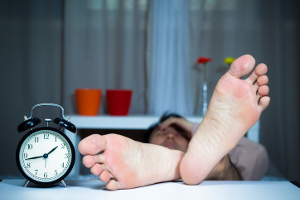Is ADHD Interfering with Your Sleep?

Sometimes, getting a good night’s sleep is not easy, especially when you’re affected by ADHD.
Many people affected by ADHD have difficulty settling down or even wanting to go to bed as a symptom of the disorder. Fifty-five percent of children and 80 percent of adults with ADHD have reported difficulties in falling asleep and/or staying asleep. Various research studies have indicated that sleep problems may:
- be a symptom of ADHD
- be worsened by ADHD
- worsen existing symptoms of ADHD
- be caused or aggravated by co-occurring conditions
Furthermore, stimulants such as ADHD medication and caffeine can interfere with sleep.
Practicing good sleep habits can improve both your sleep and your ADHD symptoms. A study published in the British Medical Journal shows a behavioral sleep intervention improved symptoms in children with ADHD.
Practice good sleep hygiene
A healthy sleep routine can benefit your overall health and help address symptoms. Basic things you can do to improve your sleep include:
- maintain a regular bedtime and wake schedule, even on weekends
- avoid caffeine after late afternoon
- avoid using nicotine or alcohol close to bedtime
- keep the bedroom for sleeping only
Although that last point may be difficult to achieve in children’s bedrooms, where they typically have a large collection of toys, making sure those are turned off and stored away before bedtime can help. Here are other suggestions that may help you or your child get a better night’s sleep:
Set a realistic time for bed, and stick to that schedule. Behavioral techniques may be necessary to help children affected by ADHD stay in bed. Children do better with structure and knowing what to expect ahead of time.
Find time for some sun. Exposure to natural light during the day helps send signals to the parts of your brain that control hormones and body temperature and make you feel sleepy or wide awake. Try to get outside and soak up some sun. If you live in a climate with limited sunlight or your work requirements make going outside impossible, consider buying a lamp or lightbox that mimics natural light.
Create an inviting room environment. Keep the bedroom dark, quiet, cool, and comfortable for the best sleep. Using a fan or humidifier to create white noise can help. Minimize potential interruptions, such as outside noise or light. Keep televisions, computers, video games, and other electronic equipment out of the bedroom, or at least turned off.
Turn off electronics an hour or two before bed. The blue light emitted from electronics (televisions, laptops, smartphones, etc.) can delay the release of the sleep-inducing hormone melatonin. These devices can also overstimulate the brain, making it harder to go to sleep.
Get plenty of exercise during the day. Exercise helps dissipate hyperactivity and feelings of restlessness in those affected by ADHD. Exercise routines should be completed at least three hours before bedtime because exercising too close to bedtime can get you worked up and make it more difficult to fall asleep.
Avoid eating too close to bedtime. Eating heavy meals too close to bedtime can interfere with a good night’s sleep. A small, non-sugary snack close to bedtime can ease bedtime hunger pangs and help maintain a healthy weight, especially if your child’s ADHD medication decreases his appetite during the day.
Establish an evening routine. People benefit from a relaxing routine at the end of the day. This helps ease the transition from the activities of the day to the calm restfulness of sleep. This is especially important for children, as they thrive on and need routines. Avoid overly exciting television viewing or game-playing near bedtime; reading a soothing story or book is better.
Talk to your doctor. Using prescribed medication or over-the-counter preparations to improve sleep is a decision to make with your health care provider. The type of medication, duration, and possible side effects are some of the considerations to take into account before starting any medication for sleep problems. Medications can affect people differently. Discuss any medication or over-the-counter sleep aid with your health care provider to determine if there are any side effects that could affect the quantity or quality of sleep.
For more information on ADHD and sleep, visit ADHD, Sleep and Sleep Disorders.
Have you found your ADHD symptoms interfering with your sleep? Or do you have suggestions to help children sleep better? Share with our community.
